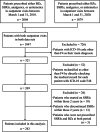Characteristics of patients with anxiety disorder without selective serotonin reuptake inhibitor prescription over a two-year period of pharmacotherapy
- PMID: 37735810
- PMCID: PMC10932764
- DOI: 10.1002/npr2.12379
Characteristics of patients with anxiety disorder without selective serotonin reuptake inhibitor prescription over a two-year period of pharmacotherapy
Abstract
Introduction: Pharmacotherapy such as selective serotonin reuptake inhibitors (SSRIs) or serotonin-noradrenaline reuptake inhibitors is recommended for the treatment of anxiety disorders. Although there are patients with persisted symptoms of anxiety disorders who are treated with monotherapy of benzodiazepine anxiolytics without SSRIs, the characteristics of these patients are unclear. In the present study, we investigated the characteristics of patients with persisted symptoms of anxiety disorder without SSRI prescription.
Methods: From a prescription dataset covering 2018 and 2020, the prescriptions of 243 patients with anxiety disorder were analyzed. Patients were classified into two groups: SSRI non-prescription and prescription groups.
Results: The SSRI non-prescription group had a higher ratio of females than did the SSRI prescription group (60.1% vs. 44.6%, respectively, p = 3.12 × 10-2 ), but statistically not significant after the Bonferroni correction. No significant differences in age, body mass index, or duration of outpatient visits were found between groups. Among the independent variables, sex (female) was the only variable identified that predicted SSRI non-prescription.
Conclusion: The present study showed that among patients with anxiety disorders, sex (female) was the only variable that predicted SSRI non-prescription.
Keywords: SSRI; anxiety disorder; anxiolytics; benzodiazepines; prescription.
© 2023 The Authors. Neuropsychopharmacology Reports published by John Wiley & Sons Australia, Ltd on behalf of The Japanese Society of Neuropsychopharmacology.
Conflict of interest statement
The authors declare no conflict of interest.
Figures
Similar articles
-
Advances in Pharmacotherapy for Pediatric Anxiety Disorders.Child Adolesc Psychiatr Clin N Am. 2023 Jul;32(3):573-587. doi: 10.1016/j.chc.2023.02.006. Epub 2023 Mar 28. Child Adolesc Psychiatr Clin N Am. 2023. PMID: 37201968 Review.
-
Prescription of benzodiazepines and antidepressants to outpatients attending a Japanese university hospital.Int J Clin Pharmacol Ther. 2007 Jan;45(1):30-5. doi: 10.5414/cpp45030. Int J Clin Pharmacol Ther. 2007. PMID: 17256448
-
Pediatrician and family physician prescription of selective serotonin reuptake inhibitors.Pediatrics. 2000 Jun;105(6):E82. doi: 10.1542/peds.105.6.e82. Pediatrics. 2000. PMID: 10835095
-
Treating Pediatric Anxiety: Initial Use of SSRIs and Other Antianxiety Prescription Medications.J Clin Psychiatry. 2018 Jan-Feb;79(1):16m11415. doi: 10.4088/JCP.16m11415. J Clin Psychiatry. 2018. PMID: 29099547 Free PMC article.
-
Comparing the efficacy of benzodiazepines and serotonergic anti-depressants for adults with generalized anxiety disorder: a meta-analytic review.Expert Opin Pharmacother. 2018 Jun;19(8):883-894. doi: 10.1080/14656566.2018.1472767. Epub 2018 May 28. Expert Opin Pharmacother. 2018. PMID: 29806492 Free PMC article. Review.
Cited by
-
Influence of SSRI and SNRI co-prescription on benzodiazepine prescription trajectories.Drug Alcohol Depend Rep. 2025 Mar 18;15:100325. doi: 10.1016/j.dadr.2025.100325. eCollection 2025 Jun. Drug Alcohol Depend Rep. 2025. PMID: 40226211 Free PMC article.
References
-
- Shinfuku M, Kishimoto T, Uchida H, Suzuki T, Mimura M, Kikuchi T. Effectiveness and safety of long‐term benzodiazepine use in anxiety disorders: a systematic review and meta‐analysis. Int Clin Psychopharmacol. 2019;34(5):211–221. - PubMed
-
- Fond G, Berna F, Boyer L, Godin O, Brunel L, Andrianarisoa M, et al. Benzodiazepine long‐term administration is associated with impaired attention/working memory in schizophrenia: results from the national multicentre FACE‐SZ data set. Eur Arch Psychiatry Clin Neurosci. 2018;268(1):17–26. - PubMed
MeSH terms
Substances
LinkOut - more resources
Full Text Sources


